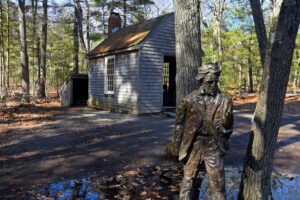By Colin McCandless, Contributing Writer

Photo by Ryan Hutton
CONCORD – Author and naturalist Henry David Thoreau intentionally lived alone in a modest cabin in the woods at Walden Pond from July 1845 until September 1847. This immersive back-to-nature experience would inspire his seminal environmental work “Walden,” published in 1854.
More than 175 years later, visitors still flock to see Walden Pond at the state park that bears its name to enjoy its recreational activities and/or learn more about the life of the celebrated transcendentalist writer and philosopher.
Numerous visitors from near and far
Walden Pond State Reservation, most of which is located either in or just outside Concord, welcomes approximately half a million annual visitors, some of whom make the trek from other states or countries. Through its association with Thoreau, the National Historic Landmark is widely regarded as the birthplace of the modern conservation movement.

Photo by Ryan Hutton
Established as public property in 1922, today the Walden Pond State Reservation offers ample recreational opportunities including a public swimming beach, hiking trails, boating, fishing and birding. There are easy hikes with gradual elevation changes, the most popular of which is a roughly two-mile loop circling the pond. The pond itself is stocked for fishing twice a year, usually some species of trout. While the park doesn’t rent boats, they do provide a boat launch for people who bring their own canoes, kayaks or boats with electric-powered motors (gas-powered motors are prohibited).
“The big draw of this place is, sort of the natural beauty of Walden itself,” said Lisa Little, forest and park supervisor with the Massachusetts Department of Conservation and Recreation. “And through Thoreau’s eyes, many people have been able to experience that in his book ‘Walden.’ But really embracing those themes of the ever-changing seasons of being kind of in this simple mindset – sort of a removal from the hustle and bustle of everyday life – I think that’s what a lot of people kind of seek out when they come here.”
Of course that comes with a caveat. If you’re seeking solitude, you’ll want to avoid the peak season and schedule your Walden Pond outing during winter or other off-season times, noted Little. The bulk of visits occur between July and October.
Besides the recreational offerings, the park also contains a replica of Thoreau’s single-room cabin. His original cabin was moved a couple of times before ultimately falling into disrepair. The last known use of the house’s roof was as a hog pen, according to Little.
Visitors center attractions

Photo by Ryan Hutton
The Walden Pond Visitors Center, built in 2016 to welcome people into the property and share the legacy of Thoreau and the history of Walden, features exhibits on his life and his time spent at Walden Pond. There are also displays about the natural history of the pond as well as a 20-minute eponymous film about Walden produced by renowned documentarian Ken Burns.
Eagles’ founding member Don Henley, who appears in the film, founded Walden Woods Project, a nonprofit dedicated to the legacy of Thoreau and the preservation of Walden Woods. The organization helps fund some of the park’s programs and has protected property adjacent to Walden Pond from development.
Thoreau would approve of the visitors center’s green architecture, a LEED (Leadership in Energy and Environmental Design) gold certified building. It’s a sleek and modern structure but it almost fades into the surrounding landscape, becoming like a part of the scenery, said Little.
Additionally, there are solar panels in the parking lot, and the park produces more energy than it consumes. EV charging stations are available onsite as well. “We’re really committed to diminishing the fossil fuel aspect, moving forward with all these things,” asserted Little.
Commenting on Thoreau’s enduring appeal and why his Walden Pond experience still resonates with people in the 21st century, Little noted that while Thoreau may have stayed here in the 1840s and witnessed the onset of the Industrial Revolution, the work has a timelessness to it.
“And I think that we still today grapple with this sort of ‘what is our place in this world in terms of technological advances and how we relate to nature,’” mused Little. “And those are just really essential questions that I think everybody at some point in time reflects on. And so, his writings were really seeking that out and trying to find these answers and trying to see, ‘Where do I belong? Where do I fit in?’”
“And also offering some ideas behind that in terms of our connection with nature—that we are a part of these places,” Little continued. “And kind of walking the ground where he trod these spots, I think is really inspirational for a lot of people.”
Corinne Smith of the Thoreau Society, a scholarly organization founded in 1941 to help promote the life, work and legacy of Thoreau, maintained that a lot of the topics Thoreau wrote about, including nature, the environment, the role of government—remain relevant today. “He’s still read, he’s still taught in school. You still see his quotes everywhere,” said Smith, who manages the Thoreau Society-run bookstore in the visitors center.
While not everyone comes to Walden Pond because of Thoreau—many people are there just to swim—he’s still a major draw. His nonconformist viewpoints, written in the first person, can also appeal to younger people trying to find themselves. Thoreau’s message of “you don’t have to be like everyone else,” can be a powerful one. “We meet people every day for whom this is a bucket-list pilgrimage,” related Smith, who has authored two books on Thoreau. “It’s a spiritual place for some people.”
Additionally, along with John Muir, Thoreau is often cited as one of the precursors of environmentalism and conservation, and his detailed observations of the natural world made during his time at Walden even provided a data set that has been informing contemporary issues such as climate change, conveyed Little. “Definitely folks come here, whether they’re literary fanatics or connect with that idea of conservation, people want to come here and see where Thoreau was,” she stated.
Originator of the tiny house movement

Photo/Ryan Hutton
Thoreau is also generally credited with being the original proponent of the tiny house movement. By promoting living simply, connecting with nature and prioritizing necessities over wants, his experiment was a formative example of minimalism—shedding our obsession with big spaces and material possessions. He built his one-room, 150-square-foot sparsely-furnished cabin in Walden using materials that cost $28, roughly a month’s salary for Thoreau, who worked as a surveyor and did other odd jobs.
Thoreau used a lot of recycled materials, including pieces of wood gleaned from a shanty he bought from an Irish railroad worker. By utilizing repurposed materials, he incorporated environmentalist principles. “Walden,” which reflected on his time at Walden Pond, praised the virtues of a stripped-down, elementary existence and extolled the merits of self-sufficiency and independence.
Smith stated that, ironically enough, Thoreau’s association with the tiny house movement was “just kind of accidental.” He sought to escape the noise of his parents’ house and his friend and fellow transcendentalist essayist and philosopher Ralph Waldo Emerson owned land next to Walden Pond. “That was just a writing retreat for him. He didn’t see himself as a model,” she explained. However, she adds that in “Walden” he also famously said, “simplify the problem of life, distinguish the necessary and the real.”
Regardless of Thoreau’s intent, his experience and the philosophy that inspired it appeals to champions of the modern tiny house movement who are looking for ways to reduce their carbon footprint and use less resources. Tiny House Talk, a blog advocating the benefits of tiny house living, calls Thoreau “an inspiring role model for those of us seeking to simplify our lives.”
Quips Little of Thoreau’s cabin, “I mean I can’t think of a more famous tiny house.” She remarked that Thoreau’s friend Channing called it “the ink stand in the woods.”
“So he came here to write,” said Little, “and certainly it became this experiment in simplicity that everybody is aware that he lived.”
If you’re planning a visit to Walden Pond, particularly during the warmer months, Little cautioned to check ahead because they have a limited capacity and can only allow a thousand people in the park at a time. Visit mass.gov and see the DCR advisory dashboard for updated park alerts on capacity and closures.
Photos/Courtesy of Massachusetts Department of Conservation and Recreation
RELATED CONTENT:
Stepping into the past at the homes of two famous writers (fiftyplusadvocate.com)
Author combines love of words with nature – Fifty Plus Advocate
After more than 50 years, Grendel’s Den is still going strong (fiftyplusadvocate.com)












